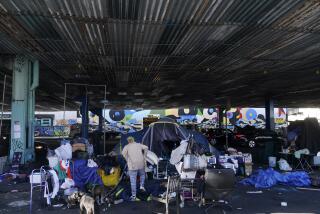Supreme Court Grants Cities New Power Over All-Male Clubs : Also Overturns Catholic Church’s Contempt Citation
- Share via
WASHINGTON — The Supreme Court today upheld a New York City ordinance barring discrimination against women and minorities by private clubs with more than 400 members, giving cities and states new ammunition in a growing legal assault on such practices.
The court also overturned a contempt citation that could have subjected the Roman Catholic Church to $100,000 a day in fines for withholding documents in a lawsuit.
But that 8-1 ruling left unanswered key questions in an 8-year-old suit by a “pro-choice” coalition that says the church’s tax-exempt status gives it an unfair advantage in the political battle over abortion rights.
In the private club case, the justices ruled unanimously that the New York City law is constitutional, at least as it is written.
Some Groups Exempted
The law banning discrimination by public accommodations exempts “distinctly private organizations.” But it deprives non-religious groups of that exempt designation if they have more than 400 members, provide regular meal service and regularly get their members’ dues paid by non-members such as the members’ employers.
Los Angeles and at least five other major cities--Buffalo, Chicago, Detroit, San Francisco and Washington--have enacted similar ordinances recently.
The New York State Clubs Assn., composed of 125 private clubs and associations, challenged the New York City law soon after it was enacted in 1984.
The city had initiated proceedings against four men-only clubs--the 10,003-member New York Athletic Club, the 4,329-member University Club, the 1,900-member Century Assn. and the 1,600-member Union League Club.
Assumptions Argued
Lawyers for the clubs association argued that the law wrongly creates an irrefutable presumption that such organizations are not truly private if they have more than 400 members and meet the other criteria.
The law’s attackers said it does not give individual clubs an opportunity to prove they should not be treated as a public accommodation.
Writing for the court today, Justice Byron R. White noted that any individual club wanting to challenge the New York City law as applied to it is free to do so.
But White said the law can be applied in a way that does not violate the constitutionally protected freedom of association.
Some Clubs Can Prove Purposes
White said some clubs may be able to prove that they were organized for “specific expressive purposes” they will not be able to pursue “if they cannot confine . . . membership to those who share the same sex, for example, or the same religion.”
But he added, “It seems sensible enough to believe that many of the large clubs covered by the (New York City) law are not of this kind.”
Two justices who joined in the opinion, Anthony M. Kennedy and Harry A. Blackmun, once belonged to male-only clubs.
More to Read
Sign up for Essential California
The most important California stories and recommendations in your inbox every morning.
You may occasionally receive promotional content from the Los Angeles Times.













